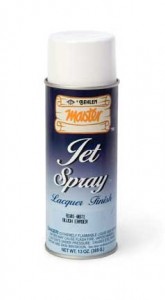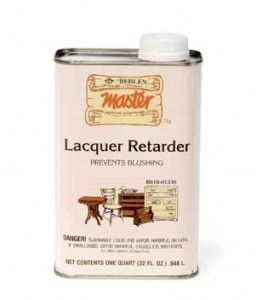Whenever I have to spray fast-drying lacquer in the summer, I gird myself for blush. I’m sure you’ve encountered blush. It’s that whitish haze that looks like thin clouds trapped in the finish, and usually shows up when spraying during humid weather.
When things  are going well, shellac and lacquer both dry very quickly because they cure strictly by having their solvent evaporate, and because very fast evaporating solvents are used in them. Normally, of course, that’s wonderful; I can spray quickly and have the piece dry quickly, a boon for those of us with less time than ambition.
are going well, shellac and lacquer both dry very quickly because they cure strictly by having their solvent evaporate, and because very fast evaporating solvents are used in them. Normally, of course, that’s wonderful; I can spray quickly and have the piece dry quickly, a boon for those of us with less time than ambition.
The problem is that moisture vapor, which is in the air all the time, can get trapped in a finish that’s being atomized into tiny droplets to spray it. Usually, not much gets in, and usually, it has time to get out before the finish cures. But hot temperatures make the solvent evaporate even more quickly, and high humidity means more moisture can get trapped in the finish. I suppose you could say that hot, humid weather is lacquer’s perfect storm, and the result is blush.
Personally, I don’t worry much about blush because it is so easy to eradicate. For one thing, it always goes away as soon as I spray another coat. True, it may show up in the next coat as well, but if I wait for cooler or less humid conditions and spray again, especially if I spray a thinner coat, I can usually get rid of the blush once and for all.
in the next coat as well, but if I wait for cooler or less humid conditions and spray again, especially if I spray a thinner coat, I can usually get rid of the blush once and for all.
If I don’t want to add another coat, aerosol cans of blush eraser, sold by Behlen in most woodworking stores, will usually do the trick. Another ace in the hole is retarder, a lacquer thinner that retards, or slows down, the evaporation rate of the lacquer. Most lacquer suppliers offer retarder thinner. I favor pure butyl cellosolve (EB, or ethylene glycol n-butyl ether); it’s a primary solvent for lacquer, and a small amount will make blush go away without slowing the dry time too much.
Shellac? No problem. If waiting for cooler evening temperatures does not work, I add some slower drying butyl alcohol. If that’s not handy, Behlen offers a slower drying mixture of ethyl and butyl alcohol called “Behkol.”
Michael Dresdner





